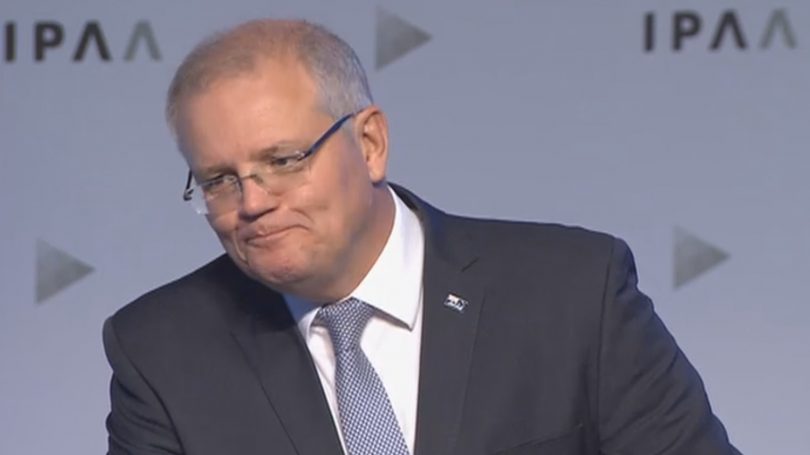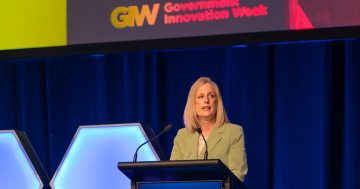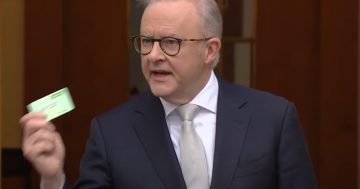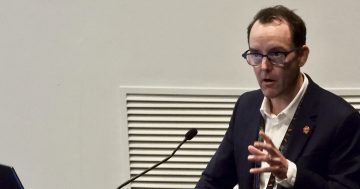
Mr Morrison said his government will continue to set clear priorities and strong targets for the APS. Photo: Parliament of Australia website.
Public servants have been told to look outside the Canberra bubble so they can focus on the quiet Australians whose voices can be drowned out by lobbyists and interest groups, and win back their trust.
Prime Minister Scott Morrison in an address to the Institute of Public Administration in the Great Hall at Parliament House on Monday also said the Australian Public Service needed to be more open to outside input, less hierarchical and focused on getting things done.
“I want the APS to have a laser-like focus on serving these quiet Australians. Those you don’t meet with and never hear from. Australians who just get on with it, but who often feel their voice gets drowned out by shoutier ones in our public square,” he said.
“There is strong evidence that the ‘trust deficit’ that has afflicted many Western democracies over recent years stems in part from a perception that politics is very responsive to those at the top and those at the bottom, but not so much to those in the middle.”
Reiterating his expectation that it is the Government and its Ministers that are responsible for policy, and the public servants for implementing it, Mr Morrison said the Public Service must be an enabler of policy not an obstacle.
“I’ve talked about the need for a culture of regulatory congestion busting in our bureaucracy,” he said. “That doesn’t mean cutting corners or not meeting regulatory obligations. But it does mean being relentless in finding ways to help Australians make things happen and reach their goals. Not sitting passively while families and businesses struggle to navigate rules and regulations.
“We need interactions with government to be simpler and less bureaucratic.”
Mr Morrison said he expected the Thodey review of the APS, which is due to be handed in in coming weeks, to address how the service needed to change to meet new and emerging challenges and be more innovative, agile and responsive to the public where they live.
Part of this will be drawing on knowledge and expertise from those outside the service, he said.
“To succeed, government needs to tap into insights, skills and energy from more points on the compass than those who have only ever worked in the public service,” Mr Morrison said.
“We need to find new ways for smart, dedicated Australians to make a contribution to public service, to see a stint in the public service as part of their career journey. And likewise for career public servants to see time outside of the APS in the non-government sector and in business as an important part of their career journey. The system should reinforce these choices.”
Mr Morrison said bureaucratic silos and hierarchies that constrained the Government’s capacity to fix problems needed to be broken down.
“We need an APS that’s more joined-up internally and flexible in responding to challenges and opportunities,” he said.
He said diversity was important not just to reflect Australia’s more pluralistic society but also to include a range of viewpoints so problems can be solved and conformity avoided.
“It’s vital that the APS avoid the sort of stale conventional wisdoms and orthodoxies that can infuse all large organisations,” Mr Morrison said.
He was concerned that just over a quarter of the APS did not really feel they could make an impact.
“This is a failure of public service management to enable real engagement. This is one of the things I expect to see public service leaders change,” Mr Morrison said.
The Prime Minister said the Australian people need to be at the centre of APS service delivery, and he wanted public servants to be results-driven.
“My Government will continue to set clear priorities and strong targets for the APS,” he said. I have established a dedicated Priorities and Delivery Unit in PM&C and all Cabinet Ministers are developing their own set of objectives and targets.”
Mr Morrison said the Government’s goal was to have all government services available digitally by 2025.
“This is part of a broader transformation challenge that includes tailoring policies and service delivery to individuals and local communities and using data and analytics for better policy and service delivery,” he said.
Original Article published by Ian Bushnell on The RiotACT.
















